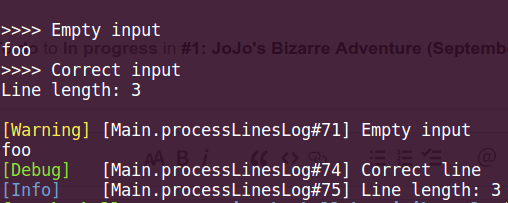co-log





Logging library based on co-log-core package. Provides
ready-to-go implementation of logging. This README contains How to tutorial on
using this library. This tutorial explains step by step how to integrate
co-log into small basic project, specifically how to replace putStrLn used
for logging with library provided logging.
All code below can be compiled and run with the following commands:
$ cabal new-build co-log
$ cabal new-exec readme
Preamble: imports and language extensions
Since this is a literate haskell file, we need to specify all our language
extensions and imports up front.
{-# LANGUAGE FlexibleContexts #-}
{-# LANGUAGE OverloadedStrings #-}
import Colog (Message, WithLog, cmap, fmtMessage, logDebug, logInfo, logTextStdout, logWarning,
usingLoggerT)
import Control.Monad.IO.Class (MonadIO, liftIO)
import Data.Semigroup ((<>))
import qualified Data.Text as Text
import qualified Data.Text.IO as TextIO
Simple IO function example
Consider the following function that reads lines from stdin and outputs
different feedback depending on the line size.
processLinesBasic :: IO ()
processLinesBasic = do
line <- TextIO.getLine
case Text.length line of
0 -> do
-- here goes logging
TextIO.putStrLn ">>>> Empty input"
processLinesBasic
n -> do
TextIO.putStrLn ">>>> Correct input"
TextIO.putStrLn $ "Line length: " <> Text.pack (show n)
This code mixes application logic with logging of the steps. It’s convenient to
have logging to observe behavior of the application. But putStrLn is very
simple and primitive way to log things.
Using co-log library
In order to use co-log library, we need to refactor processLinesBasic
function in the following way:
processLinesLog :: (WithLog env Message m, MonadIO m) => m ()
processLinesLog = do
line <- liftIO TextIO.getLine
case Text.length line of
0 -> do
-- here goes logging
logWarning "Empty input"
processLinesLog
n -> do
logDebug "Correct line"
logInfo $ "Line length: " <> Text.pack (show n)
Let’s summarize required changes:
- Make type more polymorphic:
(WithLog env Message m, MonadIO m) => m ()
- Add
liftIO to all IO functions.
- Replace
putStrLn with proper log* function.
Running actions
Let’s run both functions:
main :: IO ()
main = do
processLinesBasic
let action = cmap fmtMessage logTextStdout
usingLoggerT action processLinesLog
And here is how output looks like:




